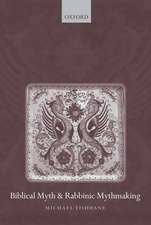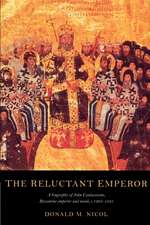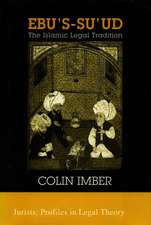The Burden of Silence: Sabbatai Sevi and the Evolution of the Ottoman-Turkish Dönmes
Autor Cengiz Sismanen Limba Engleză Paperback – 16 noi 2017
| Toate formatele și edițiile | Preț | Express |
|---|---|---|
| Paperback (1) | 307.88 lei 31-37 zile | |
| Oxford University Press – 16 noi 2017 | 307.88 lei 31-37 zile | |
| Hardback (1) | 595.84 lei 31-37 zile | |
| Oxford University Press – 10 sep 2015 | 595.84 lei 31-37 zile |
Preț: 307.88 lei
Preț vechi: 349.57 lei
-12% Nou
Puncte Express: 462
Preț estimativ în valută:
58.92€ • 61.29$ • 48.64£
58.92€ • 61.29$ • 48.64£
Carte tipărită la comandă
Livrare economică 03-09 aprilie
Preluare comenzi: 021 569.72.76
Specificații
ISBN-13: 9780190698560
ISBN-10: 019069856X
Pagini: 340
Ilustrații: 16 illus.
Dimensiuni: 155 x 231 x 23 mm
Greutate: 0.5 kg
Editura: Oxford University Press
Colecția OUP USA
Locul publicării:New York, United States
ISBN-10: 019069856X
Pagini: 340
Ilustrații: 16 illus.
Dimensiuni: 155 x 231 x 23 mm
Greutate: 0.5 kg
Editura: Oxford University Press
Colecția OUP USA
Locul publicării:New York, United States
Recenzii
Sisman's own research into different branches of the Sabbatean movement is substantiated and enriched by his personal encounters with surviving members of the sect Cengiz Sisman's historical account also reminds us how little has changed in our confused attitude to questions of religion and ethnicity.
This is the first comprehensive study of the history of a unique religious phenomenon: the development and survival, for three and a half centuries, of a sect of messianic Jews, who believed in the Messiah Sabbatai Sevi, and following him converted to Islam and lived as a secret group in Turkey. Sisman brilliantly analyzes the religious, social, and cultural background of their history and presents in this volume an intriguing picture of their beliefs and social integration in their surroundings. It critically yet nicely complements Gershom Scholem's magisterial work, Sabbatai Sevi: The Mystical Messiah.
By engaging with the available sources, Sisman elegantly constructs the history of one of the most mysterious communities, the Dönmes, within the broader Ottoman-Turkish and Eurasian contexts. This is a path-breaking study, which demonstrates how this enigmatic community survived through the early modern and modern times, and made significant contributions to Ottoman and Turkish modernizations along the way.
This book, based on years of research in various sources in multiple languages, is a highly significant study of the phenomenon of Sabbateanism over the centuries. Meticulously researched and contextualized, it makes a very important contribution to Ottoman, Turkish, and Jewish history.
What distinguishes Sisman's book is its original, comprehensive integration of all three primary types of sources on the subject: Jewish, Christian-European, and Muslim-Ottoman. Especially praiseworthy is the effort to collect all Ottoman sources on the subject, both the wellknown and the unknown, under one research roof, and further, to put them through an impressive historical analysis against the familiar sources used intensively in past and current research.
The biggest contribution of the book is its objective to complement and correct the literature on Sevi written by Gershom Scholem and other scholars by putting the Dönme phenomenon within the context of Ottoman and Turkish history.
The book contextualizes this crypto-Judaic community in the Ottoman Empire and Turkish Republic and enables a decolonial re-thinking of the Dönme history from an Ottoman-Turkish-Muslim point-view.
This is the first comprehensive study of the history of a unique religious phenomenon: the development and survival, for three and a half centuries, of a sect of messianic Jews, who believed in the Messiah Sabbatai Sevi, and following him converted to Islam and lived as a secret group in Turkey. Sisman brilliantly analyzes the religious, social, and cultural background of their history and presents in this volume an intriguing picture of their beliefs and social integration in their surroundings. It critically yet nicely complements Gershom Scholem's magisterial work, Sabbatai Sevi: The Mystical Messiah.
By engaging with the available sources, Sisman elegantly constructs the history of one of the most mysterious communities, the Dönmes, within the broader Ottoman-Turkish and Eurasian contexts. This is a path-breaking study, which demonstrates how this enigmatic community survived through the early modern and modern times, and made significant contributions to Ottoman and Turkish modernizations along the way.
This book, based on years of research in various sources in multiple languages, is a highly significant study of the phenomenon of Sabbateanism over the centuries. Meticulously researched and contextualized, it makes a very important contribution to Ottoman, Turkish, and Jewish history.
What distinguishes Sisman's book is its original, comprehensive integration of all three primary types of sources on the subject: Jewish, Christian-European, and Muslim-Ottoman. Especially praiseworthy is the effort to collect all Ottoman sources on the subject, both the wellknown and the unknown, under one research roof, and further, to put them through an impressive historical analysis against the familiar sources used intensively in past and current research.
The biggest contribution of the book is its objective to complement and correct the literature on Sevi written by Gershom Scholem and other scholars by putting the Dönme phenomenon within the context of Ottoman and Turkish history.
The book contextualizes this crypto-Judaic community in the Ottoman Empire and Turkish Republic and enables a decolonial re-thinking of the Dönme history from an Ottoman-Turkish-Muslim point-view.
Notă biografică
Cengiz Sisman is Professor of History at University of Houston, Clear Lake.



















